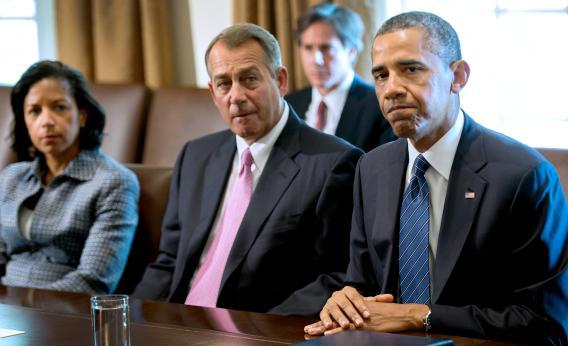Thomas Edsall has a fascinating post looking at the geographic and demographic microfoundation of the new Democratic Party coalition that I really recommend you read. It shows that in important ways the partisan divide in Washington is built atop a real divide in American society and lifestyles—a divide that includes ethnic difference but also an important gap inside the white population around secularism and family structure. But I think ultimately Edsall overreaches by trying to say that these factors explain the extreme levels of gridlock inside the Beltway:
It isn’t just that it’s getting harder to compromise — or that a lack of compromise is what many voters want — but that the topics that divide us are among the most difficult on which to achieve consensus: matters of personal intimacy – not only sex, love and children, but freedom and individual autonomy. This has not always been the stuff of politics; it is now.
That’s all true, but to me the striking thing about American politics today is the extent to which politicians in Congress don’t reach agreements even when the American people aren’t sharply divided. Take the massive, entrenched, years-long dispute over taxes and the federal budget. If you go into the survey data, you find that there absolutely is not a firm partisan divide on this issue. Fifty-six of self-identified Republican voters agree with Barack Obama that deficit reduction should involve both spending cuts and tax increases, and 56 percent of self-identified Democratic voters endorse the view that deficit reduction should be mostly spending cuts.
You never want to exaggerate the significance of this kind of issue polling. But I think the message is clear. If key Republican leaders—John Boehner, Mitch McConnell, Paul Ryan, etc.—wanted to shake hands on a bargain that raised taxes a fair amount and cut spending by three or four times that amount, Obama would gladly take the deal and a strong cross-party majority of Americans would applaud. The Obama administration has been trying on and off for years to reach such a deal, in part because members of the administration strongly favor such a deal on the merits and in part precisely because they know this kind of thing would be popular politically. But the deal keeps not happening. It doesn’t happen because at an elite level the Republican Party is much more strongly committed to an agenda of low tax cuts on the rich than are Republican Party voters. Democrats have their own issues where elected officials muster a level of intransigence not found among Democratic Party voters, but the difference is that taxes are absolutely fundamental to public policy. With no ability to compromise on taxes, there’s no way to reach larger compromises on almost anything relating to the economy. This is the fundamental driver of paralysis on the Hill, and yet it has nothing to do with the underlying structure of public opinion.
